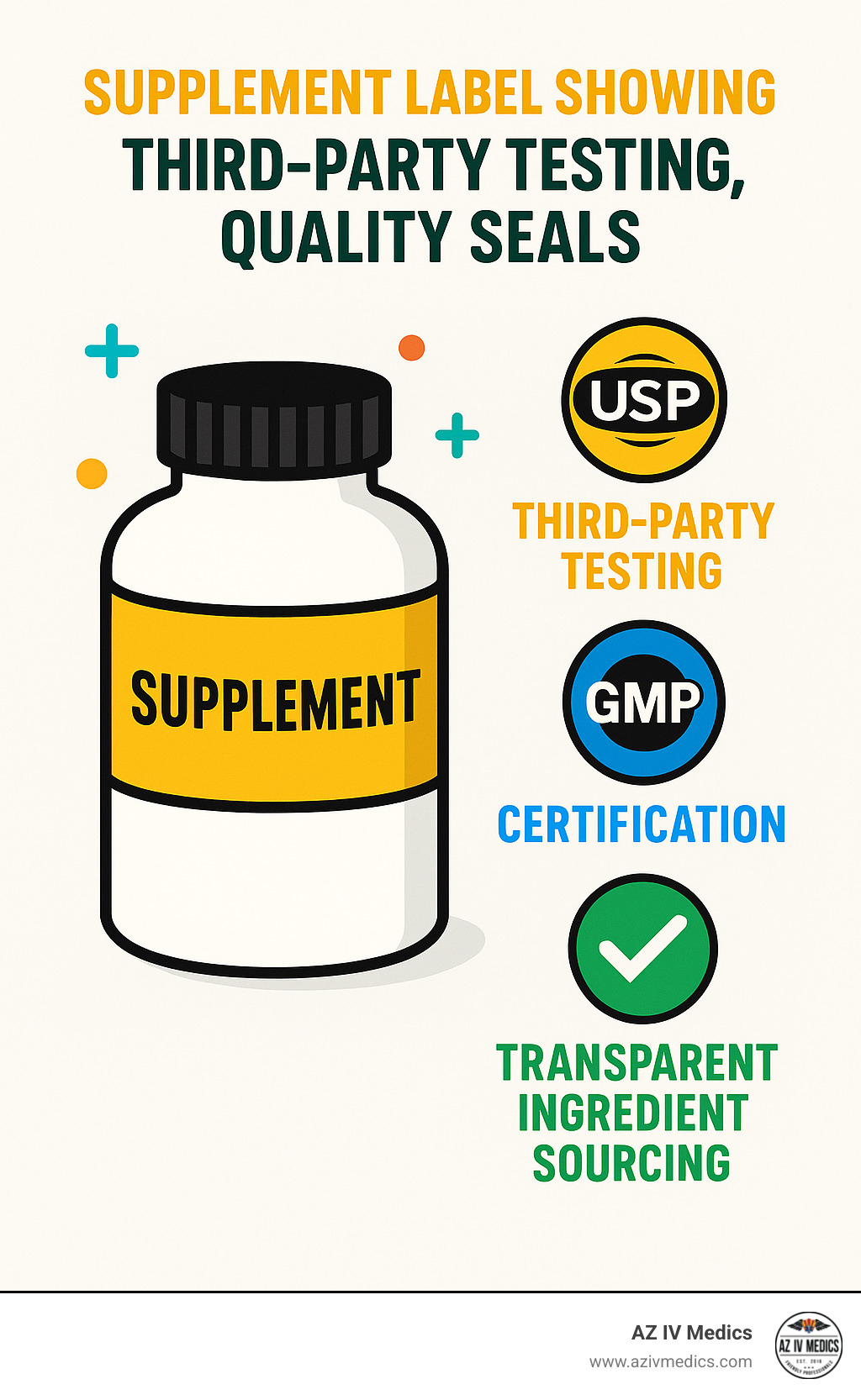Supplemental Strength: The Ultimate Immunity Boosters Ranked
Joseph Lopez AZIVM • June 12, 2025
Finding the Best Immune Support in a Bottle

The best immunity supplements for overall immune support are:
- Vitamin D3 - 1000-2000 IU daily (essential for immune cell function)
- Vitamin C - 250-1000 mg daily (antioxidant protection)
- Zinc - 15-30 mg daily (supports immune cell development)
- Probiotics - 1-10 billion CFU daily (gut-immune connection)
- Elderberry - 150-300 mg daily (during cold/flu season)
When wellness has become a priority, the search for effective immune support has never been more relevant. While no supplement can replace a healthy lifestyle, certain nutrients have shown promising results in supporting your body's natural defenses. When deficiencies exist, the best immunity supplements can help fill crucial nutritional gaps that might otherwise compromise your immune function.
The effectiveness of immune supplements varies widely based on individual needs, quality of ingredients, and whether you have specific deficiencies. Research consistently shows that vitamin D, vitamin C, and zinc form the foundation of immune support supplementation, while specialized ingredients like elderberry and medicinal mushrooms may offer additional benefits during seasonal challenges.
My name is Joseph Lopez AZIVM, and I've spent over 7 years evaluating the effectiveness of best immunity supplements while helping patients optimize their immune health through both oral supplementation and targeted IV therapy solutions. My experience has shown that while supplements can be beneficial, understanding which ones actually work—and when to use them—makes all the difference in supporting long-term immune resilience.

How Your Immune System Works (and Where Supplements Fit In)
Before we talk about what to take, let's understand what we're actually supporting. Your immune system isn't just one thing—it's an amazing network of cells, tissues, and organs all working together to keep you healthy.
Think of your immune system as your body's personal security team, with different members handling different threats:
Your first line of defense includes your skin, the mucus in your nose, stomach acid, and even the friendly bacteria living on and in your body. These barrier defenses work 24/7 to keep harmful invaders out.
When something does break through, your innate immune cells—like neutrophils and natural killer cells—rush to the scene. These cells have been with you since birth and respond quickly, though they treat all threats similarly.
Behind them is your adaptive immune system—the special forces team that remembers specific invaders. Your B and T cells create a memory of each pathogen, allowing for a faster, stronger response if that same threat returns.

"When people talk about 'boosting' immunity, what they're really looking for is supporting normal immune function," we often explain to our patients at AZ IV Medics. "No supplement can push your immune system beyond its natural capabilities—it's more about giving it everything it needs to work at its best."
This is where micronutrients come into play. Your immune cells need specific vitamins and minerals to develop, communicate, and function properly. Without them, your body's defense system can't perform at its peak.
For example, when you don't get enough zinc, your body produces fewer immune cells, and the ones you do have don't work as well. Similarly, low vitamin D levels have been linked to a higher risk of catching infections. Scientific research on immune basics confirms these connections between nutrition and immune function.
The best immunity supplements work by addressing these potential nutritional gaps—not by creating some kind of super-charged immune response. They're more like ensuring your car has all the fluids it needs to run smoothly, rather than installing a turbocharger.
Understanding this difference helps explain why supplements work better for some people than others. If you're already getting all the nutrients you need from your diet, adding more may not make a noticeable difference. But if you're deficient in certain areas, the right supplements can help restore your immune system to its natural strength.
Ranking the Best Immunity Supplements for 2024
When it comes to supporting your immune system, not all supplements are created equal. After years of working with patients and reviewing the latest research, I've seen which supplements truly make a difference and which ones fall short of their promises.
Our rankings below are based on what actually works—combining scientific evidence with real-world results we've observed in our patients. We've considered how well your body can use these nutrients, their safety profiles, and whether they're worth your hard-earned money.
Here's my honest assessment of the best immunity supplements available today:
| Supplement | Recommended Daily Dose | RDA (Adults) | Upper Limit | Evidence Rating |
|---|---|---|---|---|
| Vitamin D3 | 1,000-2,000 IU | 600-800 IU | 4,000 IU | ★★★★★ |
| Vitamin C | 250-1,000 mg | 75-90 mg | 2,000 mg | ★★★★☆ |
| Zinc | 15-30 mg | 8-11 mg | 40 mg | ★★★★☆ |
| Probiotics | 1-10 billion CFU | No established RDA | N/A | ★★★☆☆ |
| Elderberry | 150-300 mg | No established RDA | N/A | ★★★☆☆ |
Let's dive deeper into each of these immune supporters and what makes them effective.
Vitamin D3 – "Sunshine" Pillar of the Best Immunity Supplements
If there's one supplement I recommend to almost everyone, it's vitamin D. Despite living in sunny Arizona, many of our patients are still surprisingly deficient in this crucial nutrient.
Why it's essential: Your immune cells have vitamin D receptors throughout them—it's like they're specifically designed to use this nutrient. Vitamin D helps your body produce natural antimicrobial compounds, manages inflammation, and keeps your T cells functioning properly.
Deficiency concerns: I've seen blood work showing that nearly half of our patients don't have optimal vitamin D levels. This is especially true during winter months or for folks who work indoors all day.
Effective dosing: While 600-800 IU is the technical recommendation, I typically suggest 1,000-2,000 IU daily for immune support. If you're severely deficient, your doctor might recommend temporarily higher doses.
Vitamin C – Antioxidant Workhorse on Every Best Immunity Supplements List
There's a reason your mom always pushed orange juice when you were feeling under the weather. Vitamin C truly is an immune system MVP.

Why it's essential: Vitamin C helps strengthen the barriers that keep germs out, powers up your white blood cells, and protects them from damage while they're fighting infections. It's also crucial for healing tissues after infection.
Deficiency concerns: While full-blown scurvy is rare these days, many people still don't get optimal amounts from their diet. Stress, smoking, and illness all burn through your vitamin C reserves quickly.
Effective dosing: The official recommendation of 75-90 mg is modest—about what you'd get in one orange. For immune support, especially during cold and flu season, I typically recommend 250-1,000 mg daily.
For severe deficiencies or during acute illness, IV vitamin C can be a game-changer. Learn more about how we use vitamin C in our IV therapy protocols for immune support.
Zinc – The Gatekeeper Mineral Earning "Best Immunity Supplements" Status
Zinc might fly under the radar compared to the vitamin superstars, but it's absolutely essential for your immune function.
Why it's essential: Think of zinc as the security system for your body. It helps develop and activate your immune cells, supports enzymatic reactions involved in fighting infection, and maintains your skin and mucous membrane barriers.
Deficiency concerns: Mild zinc deficiency is surprisingly common, especially among older adults, vegetarians, and people with digestive issues.
Effective dosing: The daily recommendation is 8-11 mg, but during cold season, I typically suggest 15-30 mg for immune support. Just don't go over 40 mg daily from supplements.
Want to learn more about how zinc works in IV form? Check out our guide to zinc IV therapy benefits.
Evidence, Dosing & Safety Checkpoints
Finding the best immunity supplements is only half the battle. Using them safely and effectively requires attention to detail and a thoughtful approach. I've seen how proper supplementation can support health—and how improper use can lead to problems.
Respecting upper limits is something I always emphasize to my patients. Your body needs certain nutrients in specific amounts, and more isn't always better. For vitamin D, going beyond 4,000 IU daily over long periods can lead to calcium building up in your bloodstream—definitely not what we want! With vitamin C, your body will let you know when you've had too much—usually with digestive complaints when you exceed 2,000 mg. And zinc supplementation above 40 mg daily can actually backfire, impairing copper absorption and weakening the very immune function you're trying to support.
Your medications matter tremendously when considering supplements. I've had patients surprised to learn that their blood thinner doesn't play nicely with vitamin E or that their echinacea might interfere with immunosuppressant medications. Zinc and certain antibiotics need to be taken hours apart, and even seemingly innocent herbs like licorice or ginseng can affect blood pressure medications. Always have a conversation with your healthcare provider about potential interactions—it's worth the time.
Certain groups need to be especially careful with supplements. Pregnant or breastfeeding women should approach supplementation conservatively, as many products haven't been adequately tested during these critical periods. Children need appropriately sized doses—they're not just small adults. Our older patients often have altered metabolism that changes how their bodies process supplements. And those with autoimmune conditions need to be particularly cautious with immune-stimulating supplements, which could potentially worsen symptoms.

Quality matters enormously in the supplement world. Unlike prescription medications, supplements undergo less regulatory oversight, which means the burden of quality control falls partly on us as consumers. I always recommend looking for products with third-party verification from organizations like USP, NSF, or ConsumerLab. These independent testers verify that what's on the label matches what's in the bottle. GMP (Good Manufacturing Practices) certification is another good sign, as is transparency about ingredient sourcing. And whenever possible, avoid unnecessary fillers, artificial colors, or common allergens.
Even the timing of your supplements can impact their effectiveness. Vitamin D , being fat-soluble, is best absorbed when taken with a meal containing some healthy fats. Zinc supplements should be taken at least two hours apart from calcium-rich foods or supplements to avoid absorption issues. With probiotics , some research suggests taking them on an empty stomach, but it's always best to follow the specific product recommendations, as formulations vary.
"At AZ IV Medics, quality and safety aren't just buzzwords—they're our foundation," I tell patients who ask about our IV formulations. "When delivering nutrients directly into the bloodstream, there's no room for cutting corners on purity or proper dosing."
The bottom line? The best immunity supplements can support your health when used wisely, but they deserve the same careful consideration you'd give any other health decision. Your immune system is too important to leave to chance or questionable products.
Lifestyle Synergy: Beyond Pills for Peak Immunity
Let's face it – even the best immunity supplements can only do so much on their own. Think of supplements as supporting actors in the blockbuster movie that is your immune health. They're important, but they need the main characters – your daily habits – to really make the story work.
When I talk with patients at AZ IV Medics, I always emphasize that supplements work best when they're enhancing an already solid foundation. The magic happens when you combine targeted supplementation with consistent healthy lifestyle practices.
Your immune system thrives when you nourish it from multiple angles. Start with your plate – colorful fruits and vegetables provide a rainbow of antioxidants and phytonutrients that support immune function in ways no single supplement can. Include quality proteins from sources like lean meats, beans, or dairy to give your body the building blocks it needs for immune cell production. Don't forget to incorporate some fermented foods like yogurt or kimchi – they're packed with natural probiotics that support your gut's immune defenses.

One often overlooked immune supporter is simply getting enough sleep. Those 7-9 hours of quality rest aren't just making you less cranky – they're when your body performs critical immune maintenance. Your immune system actually recharges while you snooze! Create a sleep-friendly environment by keeping your bedroom cool, dark, and quiet. Your immune cells will thank you for it.
Movement matters tremendously for immune health, but balance is key. Moderate activity for 30-60 minutes most days improves immune surveillance – essentially helping your immune cells patrol more effectively. But here's an important caution: excessive intense exercise without adequate recovery can temporarily suppress immunity. Find your sweet spot with a mix of cardiovascular and strength training. Even a daily walk provides meaningful immune benefits.
Stress management might be the unsung hero of immune support. When chronic stress keeps your cortisol levels liftd, your immune function takes a hit. Find what helps you decompress – whether it's meditation, deep breathing, yoga, or just setting better boundaries in your life. Social connections matter too – positive relationships actually support immune health. Who knew that coffee date was strengthening your immune system?
Staying properly hydrated is fundamental to immune function. Aim for approximately 2-3 liters of fluid daily, more during illness or hot weather. And yes, your morning coffee or tea does count toward your daily total! During periods of increased immune challenges, IV hydration with immune-supporting nutrients can provide an extra boost when you need it most.
"We see the best results in patients who approach immune health holistically," I often tell people at AZ IV Medics. " The best immunity supplements work like reinforcements for an army that's already well-trained, well-fed, and well-rested."
Looking for more simple ways to support your immune system through everyday habits? Check out our guide on easy ways to boost your immune system. Your immune system is your body's most powerful defense – give it the comprehensive support it deserves!
Frequently Asked Questions about the Best Immunity Supplements
Do high doses work better than standard amounts?
I'm often asked if taking extra-large doses of supplements provides better immune protection. The truth is, more isn't always better when it comes to supporting your immune system.
Most nutrients work on what we call a threshold effect—once your body has what it needs, adding more doesn't create additional benefits. In fact, it might even backfire. Take vitamin C, for instance. While it's generally safe, exceeding 2,000 mg daily typically just leads to an upset stomach without boosting your immunity any further.
"I like to think of it as filling a glass of water," I tell my patients at AZ IV Medics. "Once the glass is full, adding more water just causes spillover—it doesn't make the glass 'more full.'"
The exception might be during times of acute illness, when higher doses administered by healthcare professionals might be appropriate. When we provide IV therapy during illness, we carefully calculate doses based on your specific situation.
Can supplements replace a balanced diet?
I wish I could tell you there's a magic pill that replaces the need for vegetables and other healthy foods, but the honest answer is no. The best immunity supplements work exactly as their name suggests—they supplement a good diet, not replace it.
Whole foods provide an intricate symphony of nutrients that work together in ways scientists are still finding. When you eat an orange, you're not just getting vitamin C—you're getting fiber that feeds beneficial gut bacteria, flavonoids that improve vitamin C's effects, and countless other compounds that work synergistically.
I often remind people: "Supplement a good diet, not instead of a good diet." Focus first on filling your plate with colorful fruits and vegetables, quality proteins, and whole grains. Then use targeted supplements to address specific needs.
Which groups truly need immunity supplements?
While anyone might benefit from strategic supplementation, some people have greater needs for the best immunity supplements :
If you've had blood tests showing specific deficiencies, targeted supplementation makes perfect sense. Our bodies need adequate raw materials to build strong immune defenses.
As we age, both our immune function and nutrient absorption naturally decline. Many adults over 65 benefit from immune-supporting supplements, particularly vitamin D and zinc.
Those with dietary restrictions—whether by choice or necessity—often miss key nutrients. If you're vegan, for example, you might need vitamin B12 and zinc supplements to support immune function.
Your nutrient needs also increase during certain life stages or situations. Pregnancy, intense athletic training, recovery from illness, and chronic stress all raise your body's requirements for immune-supporting nutrients.
"Everyone's immune system is as unique as their fingerprint," I explain to patients at AZ IV Medics. "What works beautifully for your neighbor might not be right for you."
That's why we take time to understand each person's health history, lifestyle, and goals before recommending any supplement regimen or IV therapy. Your immune system deserves personalized care, not one-size-fits-all solutions.
If you're wondering about the best approach for your specific situation, consider our IV immune support services , where we can provide personalized guidance along with targeted nutrient delivery.
Conclusion
When searching for the best immunity supplements , science consistently points to a foundation of essential nutrients—with vitamin D3, vitamin C, and zinc leading the pack. These core supplements, potentially improved with probiotics and carefully selected botanicals, create a solid base for immune support. But here's the reality I've seen firsthand: supplements work best when they're just one piece of your wellness puzzle, not the entire solution.
Your immune system thrives when supplements complement good nutrition, restorative sleep, regular movement, effective stress management, and proper hydration. It's this holistic approach that truly builds resilience.
At AZ IV Medics, we meet you wherever you are on your health journey. For some folks, that means addressing specific nutrient gaps through targeted oral supplements. For others—especially those facing acute immune challenges or struggling with nutrient absorption—our mobile IV therapy services deliver immune-supporting nutrients directly to your bloodstream, bypassing digestive limitations entirely.
Our Immune Support IV therapy combines precisely measured amounts of vitamin C, B-complex vitamins, and zinc, administered by our experienced medical team in the comfort of your own space. Whether you're at home nursing a cold, in a hotel room recovering from travel, or at the office during a demanding week, we come to you across Phoenix, Tucson, Scottsdale, Mesa, and Flagstaff. This approach becomes particularly valuable during cold and flu season or when you need rapid immune reinforcement.
While I'm a firm believer in the power of supplements, I always emphasize they work best when used thoughtfully within a complete health strategy. If you're managing health conditions or taking medications, a quick conversation with your healthcare provider can ensure your supplement choices support your specific needs.
For personalized guidance on strengthening your immune defenses or to explore how our mobile IV therapy might fit into your wellness routine, visit our Immune Support service page or reach out to our friendly team directly.
Supporting your immune system isn't about finding some magical pill—it's about building a foundation of wellness with targeted nutrition when needed. With this balanced approach, your immune system can function at its best, ready to handle whatever challenges life throws your way.




